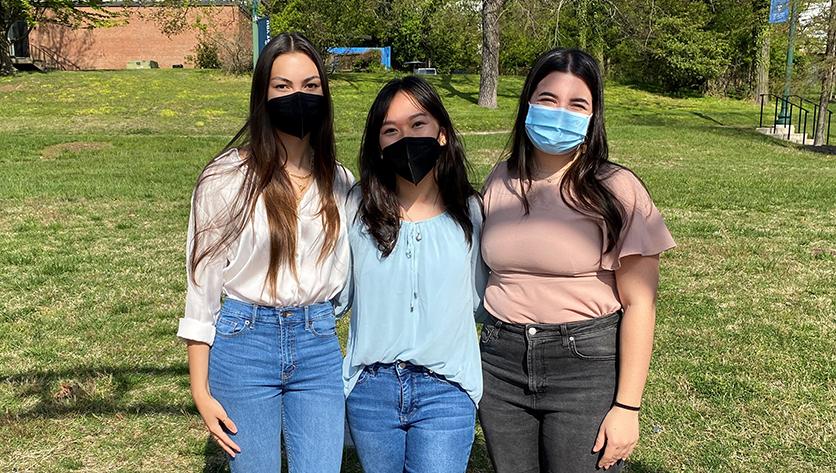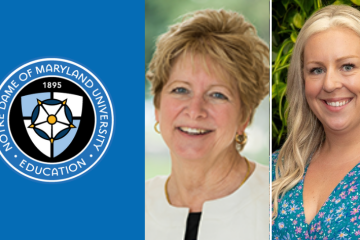Sister Alma Science Year Sets Up NDMU Students for Success Through Lab Research Opportunities

By: Erik Pedersen, Senior Communications Manager
BALTIMORE – Sister Mary Alma McNicholas, SSND, Ph.D., better known as Sr. Alma during her time at Notre Dame of Maryland University, was a beloved figure on campus for six decades. The first 52 of her 60 years at NDMU were spent in the Biology Department, including 38 years as the department’s chair.
While Sr. Alma retired in 1997 and passed away a year later at the age of 95, the memory of her lifelong dedication to increasing STEM opportunities for women lives on through Notre Dame’s Sister Alma Science Year. The annual program pairs up to three NDMU science students with a faculty mentor at Johns Hopkins School of Medicine. They will then spend a full year studying a topic of interest with a team of other researchers in a Hopkins laboratory.
“It’s an amazing opportunity for students who are interested in research,” said Dr. Becky Zordan, chair of NDMU’s Biology Department and the Sr. Alma Science Year program coordinator. “The sky is the limit for them with the number of different types of research offered at Hopkins. We’ve had some students do wet bench research, while others focus on clinical or public-health oriented research. It all depends on the individual.”
Originally established as the Sister Alma McNicholas Scholarship to support biology majors in 1983, the program was upgraded to a partnership with Johns Hopkins in 2007 and renamed the Sr. Alma McNicholas Women Scientists Program. Five years later, the program took on its current name after growing to a year-long opportunity, with students able to work full-time at Hopkins in the summer prior to the academic year for which they are funded. The students then continue working for approximately 10 hours per week as research assistants during the fall and spring semesters. Students receive a stipend for their work, with additional money available to cover living expenses in the summer months.
Ashley Anderson, Isabella Dallasta and Janelle Sangalang, all members of the Class of 2022 who graduated on May 22, were Notre Dame’s Sr. Alma scholarship recipients for the 2021-22 academic year. Their Hopkins mentors worked in the biological chemistry, neurology and cardiac surgery departments, leading to three unique research opportunities for the trio.
Anderson was paired with Dr. Erin Foley in biological chemistry. Included in her research was an investigation into bacterial cell division in the lab’s model organism – Caulobacter crescentus – as part of an overall goal to develop new antibiotics and suppress the threat of antibiotic resistance.
“I have learned so many things in this lab,” Anderson said. “Not just biochemistry and microbiology techniques, but learning about the process behind developing a project, troubleshooting and working with others in the lab. This experience has also provided me with amazing mentorship. Altogether, it has made me really enjoy research, and it made me want to pursue more research in the future.”
After graduation, Anderson will move to Cambridge, Massachusetts, to work as a research associate at The Broad Institute of MIT and Harvard, working in the Cancer Dependency Map Target Discovery and Advancement Lab (DepMap TDA).
The program is open to rising sophomores, juniors and seniors majoring in a science discipline at NDMU, with applicants required to hold a minimum grade-point average of 3.4. With only three spots available each year, the selection process can be quite competitive.
“The Sr. Alma program had been on my radar ever since I applied to Notre Dame,” Dallasta said. “It was an amazing experience. It was great to get in-person experience, speak with doctors, work on projects and also have my own projects. I got the opportunity to participate in the Sr. Alma program, and it has led to countless other opportunities for me moving forward.”
Those who participate in the program frequently use the experience as a springboard for future professional growth after graduating from NDMU.
“We’ve had 17 individuals participate since I took over as coordinator, and pretty much everyone is still working in a scientific field,” Dr. Zordan said. “Seven of the 17 were accepted into graduate research programs, with several pursuing PhDs. We’ve had three people go into medical school, one is in dental school, some are working for biotech companies in the area. It really sets them up for success.”
As a growing number of NDMU students benefit from the scholarship – three new recipients have already been selected for the 2022-23 academic year – their accomplishments ensure that Sr. Alma will continue to have a positive impact on STEM majors at Notre Dame long after her departure.
“Sr. Alma predated most people who are here on campus now,” Dr. Zordan said. “But this endowment, having such a vibrant program in her memory, it keeps her legacy fresh in all of our minds.”
Established in 1895, Notre Dame of Maryland University (NDMU) is a private, Catholic institution in Baltimore, Maryland, with the mission to educate leaders to transform the world. Notre Dame has been named one of the best "Regional Universities North" by U.S. News & World Report.




